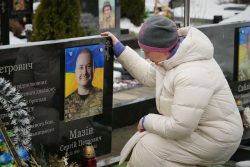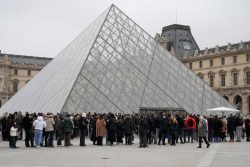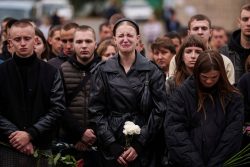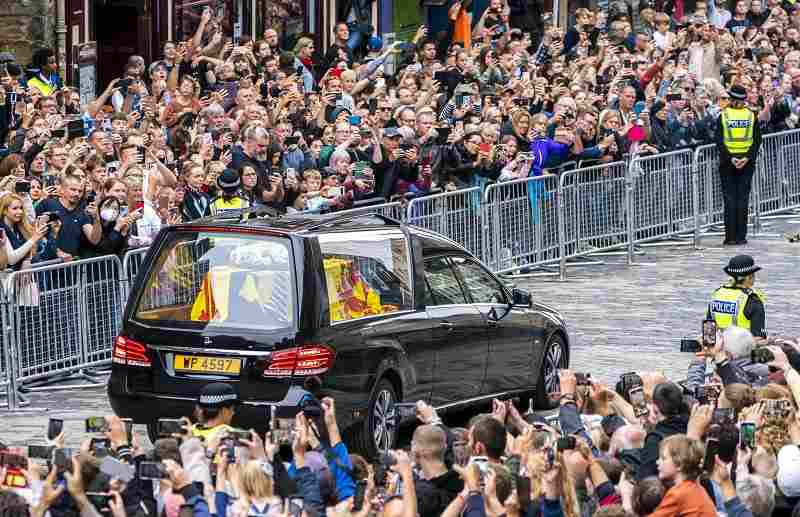
The hearse carrying the coffin of Queen Elizabeth II, draped with the Royal Standard of Scotland, passes the City Chambers on the Royal Mile, Edinburgh, Sunday, Sept. 11, 2022 on the journey from Balmoral to the Palace of Holyroodhouse in Edinburgh, where it will lie in rest for a day.
11:21 JST, September 12, 2022
EDINBURGH, Scotland (AP) — In a somber, regal procession, Queen Elizabeth II’s flag-draped coffin was driven slowly through the Scottish countryside Sunday from her beloved Balmoral Castle to the Scottish capital of Edinburgh. Mourners packed city streets and highway bridges or lined rural roads with cars and tractors to take part in a historic goodbye to the monarch who had reigned for 70 years.
The hearse drove past piles of bouquets and other tributes as it led a seven-car cortege from Balmoral, where the queen died Thursday at 96, for a six-hour trip through Scottish towns to Holyroodhouse palace in Edinburgh. The late queen’s coffin was draped in the Royal Standard for Scotland and topped with a wreath made of flowers from the estate, including sweet peas, one of the queen’s favorites.
The procession was a huge event for Scotland as the U.K. takes days to mourn its longest-reigning monarch, the only one most Britons have ever known. People turned out hours early to grab a space by the police barricades in Edinburgh. By afternoon, the crowds were 10 people deep.
“I think she has been an ever-constant in my life. She was the queen I was born under, and she has always been there,” said Angus Ruthven, a 54-year-old civil servant from Edinburgh. “I think it is going to take a lot of adjusting that she is not here.”
Silence fell on the packed Royal Mile in Edinburgh as the hearse carrying the queen arrived. But as the convoy vanished from view, the crowd spontaneously started clapping.
“A very historic moment. I am quite speechless actually,” said Fiona Moffat, a 57-year-old office manager from Glasgow. “She was a lovely lady. Great mother, grandmother. She did well. I am very proud of her.”
When the hearse reached Holyroodhouse, members of the Royal Regiment of Scotland, wearing green tartan kilts, carried the coffin past the queen’s youngest three children —Princess Anne, Prince Andrew and Prince Edward — into the throne room, where it was to remain until Monday afternoon so staff can pay their last respects.
King Charles III and his Queen Consort Camilla will travel Monday to Edinburgh to join another solemn procession that takes the queen’s coffin to St. Giles Cathedral on the city’s Royal Mile. There the coffin will remain for 24 hours so the Scottish public can pay their respects before it is flown to London on Tuesday.
The first village the cortege passed through was Ballater, where residents regard the royal family as neighbors. Hundreds of people watched in silence. Some threw flowers in front of the hearse.
“She meant such a lot to people in this area. People were crying, it was amazing to see,” said Victoria Pacheco, a guest house manager.
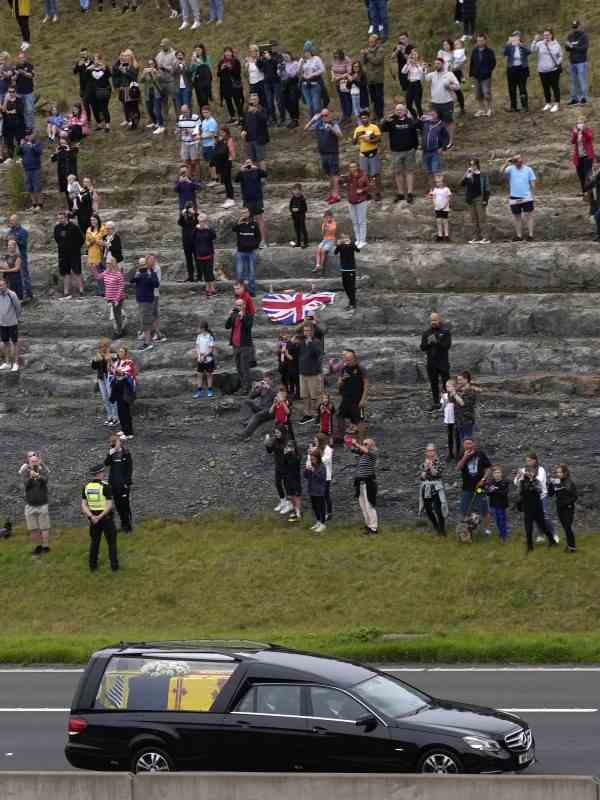
Spectators watch as the cortege with the hearse carrying the coffin of Queen Elizabeth II drives on the M90 motorway as it makes its journey to Edinburgh from Balmoral in Scotland, Sunday, Sept. 11, 2022.
In each Scottish town and village, the entourage was met with respect. People stood mostly in silence; some clapped politely, others pointed their phone cameras at the passing cars. In Aberdeenshire, farmers lined the route with an honor guard of tractors.
Along the route, the cortege passed through locations laden with House of Windsor history. Those included Dyce, where in 1975 the queen formally opened the U.K.’s first North Sea oil pipeline, and Fife, near St. Andrews University, where her grandson Prince William, now the Prince of Wales, studied and met his future wife, Catherine.
Sunday’s solemn drive came as the queen’s eldest son was formally proclaimed the new monarch — King Charles III — in the rest of the United Kingdom: Scotland, Wales and Northern Ireland. It came a day after a pomp-filled accession ceremony in England.
“I am deeply aware of this great inheritance and of the duties and heavy responsibilities of sovereignty, which have now passed to me,” Charles said Saturday.
Just before the proclamation was read Sunday in Edinburgh, a protester appeared with a sign condemning imperialism and urging leaders to “abolish the monarchy.” She was taken away by police. Reaction was mixed. One man shouted, “Let her go! It’s free speech!” while others shouted: “Have some respect!”
Still, there was some booing in Edinburgh when Joseph Morrow, Lord Lyon King of Arms, finished his proclamation with “God save the king!”
That upset Ann Hamilton, 48.
“There’s tens of thousands of people here today to show their respect. For them to be here, heckling through things, I think it was terrible. If they were so against it, they shouldn’t have come,” she said.
Still, it was a sign of how some, including people in Britain’s former colonies, are struggling with the legacy of the monarchy — and its future.
Earlier in the day, proclamations were read in other parts of the Commonwealth, including Australia and New Zealand.
Charles, even as he mourned his late mother, got to work at Buckingham Palace, meeting with the secretary-general and other Commonwealth envoys. Many in those nations are grappling with both affection for the queen and lingering bitterness over their colonial legacies, which ranged from slavery to corporal punishment in African schools to looted artifacts held in British cultural institutions.
Australian Prime Minister Anthony Albanese, who is in favor of an Australian republic, said Sunday that now was not the time for a change but for paying tribute to the late queen. India, a former British colony, observed a day of state mourning, with flags lowered to half-staff.
Amid the grief enveloping the House of Windsor, there were hints of a possible family reconciliation. Prince William and his brother Harry, together with their respective wives, Catherine, Princess of Wales, and Meghan, Duchess of Sussex, delighted mourners near Windsor Castle with a surprise joint appearance Saturday.
The queen’s coffin was taking a circuitous journey back to the capital. After it is flown to London on Tuesday, the coffin will be moved from Buckingham Palace on Wednesday to the Houses of Parliament to lie in state until a state funeral at Westminster Abbey on Sept. 19.
In Ballater, the Rev. David Barr said locals consider the royal family as neighbors.
“When she comes up here, and she goes through those gates, I believe the royal part of her stays mostly outside,” he said of the queen. “And as she goes in, she was able to be a wife, a loving wife, a loving mum, a loving gran and then later on a loving great-gran — and aunty — and be normal.”
Elizabeth Taylor, from Aberdeen, had tears in her eyes after the hearse passed through Ballater.
“It was very emotional. It was respectful and showed what they think of the queen,” she said. “She certainly gave service to this country, even up until a few days before her death.”
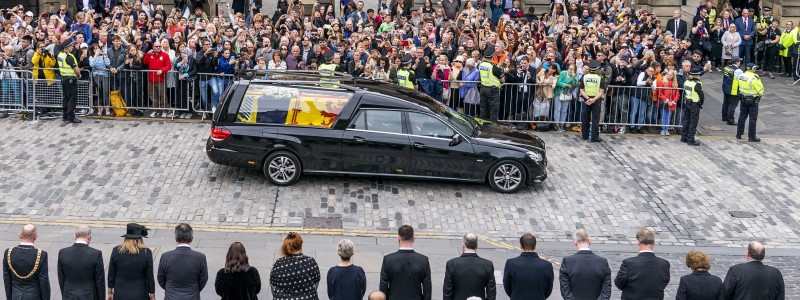
The hearse carrying the coffin of Queen Elizabeth II, draped with the Royal Standard of Scotland, passes the City Chambers on the Royal Mile, Edinburgh, Sunday, Sept. 11, 2022 on the journey from Balmoral to the Palace of Holyroodhouse in Edinburgh, where it will lie in rest for a day.
Top Articles in News Services
-

Survey Shows False Election Info Perceived as True
-

Hong Kong Ex-Publisher Jimmy Lai’s Sentence Raises International Outcry as China Defends It
-

Japan’s Nikkei Stock Average Touches 58,000 as Yen, Jgbs Rally on Election Fallout (UPDATE 1)
-

Japan’s Nikkei Stock Average Falls as US-Iran Tensions Unsettle Investors (UPDATE 1)
-

Trump Names Former Federal Reserve Governor Warsh as the Next Fed Chair, Replacing Powell
JN ACCESS RANKING
-

Producer Behind Pop Group XG Arrested for Cocaine Possession
-

Japan PM Takaichi’s Cabinet Resigns en Masse
-

Man Infected with Measles Reportedly Dined at Restaurant in Tokyo Station
-

Israeli Ambassador to Japan Speaks about Japan’s Role in the Reconstruction of Gaza
-

Videos Plagiarized, Reposted with False Subtitles Claiming ‘Ryukyu Belongs to China’; Anti-China False Information Also Posted in Japan


